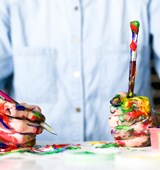There’s a worldview that treats creativity as if it were a rare and precious commodity, available in limited quantities only to the luckiest among us, and quickly depleted. Perhaps you see it as a type of magic that some people happen to be blessed with, like Wizards in a world of Muggles.
Some people “have it.” Other people don’t—and, we tell ourselves, they never will.
There’s something strangely seductive about this idea because it relieves any kind of personal responsibility for success.
Instead of developing good creative habits and the technical skills needed to execute their vision, this worldview enables people to say things like, “Lady Gaga’s only good at writing songs because she was born with a ton of talent,” or “I know I’ve been talking about my script for 10 years while my favorite filmmaker wrote and directed six new movies, but that’s not fair, he’s a genius!”
When we see someone else’s success as a product of random chance or divine gifts, it’s easy to make excuses.
But conspicuously missing from this conception is the idea that a lot of creativity is a set of behaviors that can be cultivated by anyone dedicated enough to put in the work. So, what if we think about creativity a little differently?
What if we demystify it a bit like Steve Jobs did when he said:
Creativity is just connecting things. When you ask creative people how they did something, they feel a little guilty because they didn't really do it, they just saw something. It seemed obvious to them after a while. That's because they were able to connect experiences they've had and synthesize new things.
This is not a romantic view of the artist or the inventor as auteur—impossible to understand, explain, or replicate. To the contrary, it’s a view of creativity that is accessible, practical, and useful for anyone who’s looking to make their mark on the world.
You don’t have to be a bonafide genius or some kind of savant to tap into your creativity. You just have to make a connection and have the confidence to follow your new idea wherever it leads.
Anyone, from any walk of life, can do this.
It will take courage. Not every connection turns into a good idea; not every good idea can be turned into something real; and not everyone is going to like what you create no matter what you do. That’s ok.
The key to creativity is to be open enough for those kinds of connections to form, and not to dismiss them or shame yourself into giving up before you put your ideas to the test. This may seem impossible, but with practice, turning creativity into a habit is attainable for everyone.


